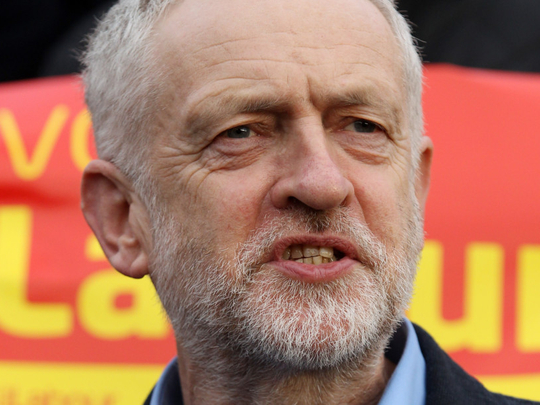
A revenge reshuffle; death threats on Twitter; activist-arrivistes wanting to deselect MPs who have served for decades; a leader saying there will be “no hiding place” for the 66 MPs who voted for Syrian air strikes. If this is the new British politics, it looks like all the worst bits of the old politics, only now with the added stress of a high-pitched whining, as the spitfires of the Labour party’s left and right battle for its moral high ground. Neither will succeed: They forgot to tend their high ground, and it is now inhabited by greens and junior doctors.
The problem is the idea of the “new politics”. Jeremy Corbyn, the Labour Party leader, having promised change, had to embody the opposite of everything Britain hates. He had to do more than opt out of the yah-boo, smug sixth-form wordplay of the House of Commons. He also had to be endlessly kind, perfectly transparent, consistent and truthful — and attract no followers who didn’t share these qualities.
Politics, however, contains many situations that are not nice. It is not nice, for instance, to disagree at the most fundamental level with everything a person believes in and stands for. Simon Danczuk wrote a compellingly weird column for the Daily Mail about his meeting with Jeremy Corbyn — how civilised and gentlemanly it was — but they plainly loathe one another. There’s no benign way to sack somebody. A “revenge reshuffle” could, in a more sympathetic telling, be a “reward reshuffle”, a leader boosting the careers of people with whom he could find some concord. And yet revenge is the story, because it comes from the man who supposedly knew no malice.
Transparency is even harder: The shambles of appointing Corbyn’s first cabinet — putting in hopeful calls to unlikely people while a Sky journalist waited at the door and wrote it all down — illustrated what happens when the new politics meets the old media. To show every decision, with all its workings, is to spew out words without a story. Someone else — a journalist, an opponent — will build your narrative for you. And yet for Corbyn to go back to the old ways — briefing against people briefing against you, whispering about whose head rolls first — has a touch of the Animal Farm. That’s before you get to the followers who have heaped disgusting abuse upon Corbyn’s rebel MPs — threats and tirades that, were they to represent the new, activist-led Labour party, would poison the project for ever. But they do not represent Labour, or indeed any kind of politics.
One of Twitter’s core uses is for a kind of performative anger. It was built for people who wanted to explode with insatiable rage, with no more intention of acting on that rage in the real world than of applying in life the lessons of Minecraft. Twitter, having drawn in those people, exposes them to one another, which makes them all worse — it is the virtual equivalent of putting an angry person in a car.
One is always stunned by the viciousness of the other side, its violence, its self-righteousness, its stupidity. You notice it mainly when you are its object of contempt: In the strange intimacy of cyberabuse, people show their darkest, most repugnant selves to their opponents. But you can bet that your own camp has its fair share of demons. Of course MPs, under attack, should report it, block it, take any and all available means; but they should never take it seriously.
The sticks-and-stones argument is easy to make from the outside; politicians in the eye of the outrage are understandably feeling the strain. I was wondering idly whether to join a Twitter hate mob myself on Friday, when the MP for Hyndburn, Graham Jones, responded to a mild email — a doctor pointing out that air strikes kill a lot of people, many of whom are in families and love one another — with: “What a load of [expletive]. Please take the issue seriously, and whilst you are at it, learn some respect.”
Since when did respect for an MP mean not questioning the way he intended to vote? How on earth was this Corbyn’s fault? (Jones later said he’d received streams of invective and Corbyn, by doing nothing to stop the invective, had legitimised and encouraged it.)
Yet, what the episode really shows is how much pressure MPs are under without the protective carapace of unity. Many, possibly all of them, right across the spectrum, see massed ranks of anonymous haters, and the very next straw will be the one that breaks them.
This is the novelty of current British politics — not Corbyn’s character or actions, but the sheer fact of Labour’s divisions. It has become routine to castigate this as somehow irresponsible — disagreeing about ideas when you should be attacking the Tory government. It is not irresponsible. It is right for Labour to search for an identity it can coalesce around. The party will not be strong enough to attack anything until it finds one.
Doubtless, the battle will look chaotic and ugly, but while it continues, everybody — from the farthest right to the farthest left of the party — will be vulnerable and undefended. Whether or not they would have chosen it, they are living courageous political lives. If they could see that in each other, and we could see and admit it in them, we might get closer to the new politics we claim to want.
— Guardian News & Media Ltd









